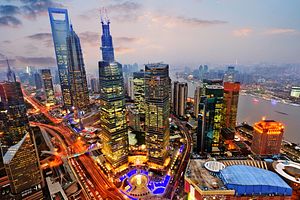No matter if China’s economy is in boom or bust, it seems to always be the subject of a larger debate on the economic benefits of democracy. Depending on whom you ask, China’s experience either validates or debunks the theory that democracy helps kindle economic growth. Beijing’s ruthlessly efficient technocracy and strong state controls have long been paraded as the basis for a new growth model and proof of democracy’s obsolescence. However, especially with signs this year that China’s economy is headed for troubled waters, the case for greater democracy in China is having a renaissance.
This March, a major study by economists from MIT, Harvard and Columbia concluded that democratic transitions statistically lead to higher GDP growth, and that China may not be an exception to the rule after all. Reflecting on his 1989 end-of-history hypothesis last month, Francis Fukuyama wrote that while the “China Model” once looked promising, long-term economic growth in China will require greater democracy.
In the end, all this may be missing the point. At this stage in China’s evolution, whether or not Chinese citizens can elect the top leadership is largely irrelevant. As long as Beijing can gauge public opinion objectively and be surgical about implementing policy in different regions, it should be able to fine-tune all the same GDP-boosting institutions that democracy supposedly enhances. Unlike many developing countries, China has already set up a strong education and welfare system. And on top of this, Beijing already appears to be adjusting to a more practical, decentralized system where local leaders have some flexibility to address the needs of the people they represent.
Though often overlooked, village leaders in China actually are selected through direct, democratic elections. Widely dismissed as rubber stamp elections with candidates curated by the party, some still turn into competitive races that draw high voter turnout. Thus, around half of China’s population already has a channel, or at the very least a symbolic one, through which to influence the policy process.
It might seem reasonable that Beijing would be willing to cede influence in rural areas, since cities have been China’s engines of growth. But in fact, the trend toward decentralization in urban areas that Kenneth Lieberthal described back in 1988 is only accelerating as cities swell. For example, when Beijing unrolled its sweeping, top-down hukou reform plan this March, its goal was to force cities to absorb some 100 million new residents. But because of the strain this will put on public services, the central government reserved the right for leaders of any city over 5 million to direct the process at their own pace. In recent years China has also taken earnest steps toward fiscal decentralization in an attempt to improve local governance. Though still unelected, province- and prefecture-level leaders are slowly gaining more control over how the cities they oversee develop.
As China’s cities grow into global centers of business and innovation, urban leaders are under increasing pressure to understand and cater to the needs of their municipality. Not only are Chinese cities competing amongst themselves for funding and resources from the center, they are also competing with cities abroad for talent and foreign direct investment. Especially as corporations and other non-state actors become more powerful and active in lobbying local leaders, there is a growing incentive to make cities more productive and efficient. Urban policy scholars such as Bruce Katz of the Brookings Institution have written extensively on the way local-level leaders have become the driving force behind growth in the US. With Chinese leaders at the helm of much larger, booming urban economies, it wouldn’t be a stretch to imagine them playing a similar role in the future.
There has been plenty of speculation that an emerging middle class and civil society in China will inevitably lead to democratic reform anyway. While this is possible, it is important to distinguish this argument from the more misguided one that democracy is China’s best strategy for increasing GDP. It is not at all clear that instating national elections in China would somehow translate into higher growth, or that a modified version of the current system could never be effective. To the contrary, Beijing seems increasingly aware of the incredible economic diversity across the country, and more inclined to let local leaders take the reigns. The end result may be a system in which cities become the dominant administrative unit, led by competent technocrats aggressively focused on boosting economic prospects and raising the standard of living. For those that fail to meet public expectation, the pressure to improve will be severe, even if it doesn’t come through democratic channels.
Zach Montague is a research analyst at the Delma Institute, specializing in East Asian politics. He holds a degree in China & Asia Pacific Studies from Cornell University and has previously worked in Washington, Beijing and Xi’an. Follow him on Twitter @ZJMontague.
































